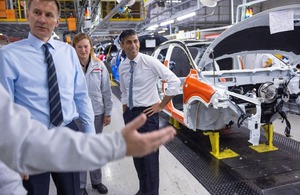To access zero tariffs under the Trade and Cooperation Agreement (TCA), businesses must prove their products include a minimum level of EU or UK manufactured content. These requirements are known as “rules of origin” and help determine where products originate rather than where they’re shipped from to ensure lower tariffs are correctly applied to eligible products and support market competition.
Under the existing Trade and Cooperation Agreement, a staged approach was introduced for electric vehicles and batteries which required phased increases in these rules of origin requirements – with the first increase due to take effect on 1 January 2024, before a final increase from 1 January 2027.
This phased approach would increase the content requirements for electric vehicles to be eligible for tariff free trade over the next three years. These were initially designed to reflect industry capability at the time and incentivise investment in domestic battery production.
However, in recognition of the disruption to the global supply chain caused by the COVID-19 pandemic and Russia’s illegal invasion of Ukraine, the UK and EU have agreed to cancel the 2024 changes, meaning the existing rules of origin will last for a further three years until the end of 2026.
This agreement facilitates UK-EU tariff-free trade in electric vehicles and prevents 10% tariffs being levied on this trade from January. Industry expects this will save car manufacturers and consumers up to £4.3 billion in additional costs and provide long term certainty to the sector as we continue to scale up our domestic battery supply chain and work to deliver our net zero commitments.
We have listened to the concerns of the automotive industry, and we have made it a priority to find a joint solution with the EU on electric vehicle tariffs that works for both sides. Today’s agreement is further evidence that our more constructive relationship with the EU is delivering for UK citizens and businesses, building on the Windsor Framework and the bespoke agreement reached on the Horizon research programme.
Prime Minister Rishi Sunak said:
We have been listening to concerns of the sector throughout this process, and I know this breakthrough will come as a huge relief to the industry.
The UK Government is delivering a pragmatic solution to keep costs down for businesses and for people at home who want to make the switch to electric vehicles.
We are also leaving no stone unturned to bolster our domestic battery industry and deliver long term certainty for our thriving automotive sector to help them grow their roots in the UK.
Business and Trade Secretary Kemi Badenoch said:
This government is determined to ensure the UK remains one of the best places in the world for automotive manufacturing. We listened to the concerns of the sector and worked hard with counterparts in Brussels and across Europe to deliver a solution that works for both sides.
Resolving issues like this one is part and parcel of being an independent trading nation. This very good result is a visible demonstration that the UK is delivering for business with trading partners around the world.
The UK will also look to agree to extend the equivalent rules of origin in the UK-Turkey preferential trade agreement ready for the end of the year, in a further boost for UK car companies who are major exporters to the Turkish market, such as Ford. This will ensure the existing rules of origin will last for a further three years until the end of 2026, and comes as the UK looks to start negotiations for a new modern free trade agreement with Turkey next year.
The agreement comes as both the UK and EU committed to working together to bolster our domestic battery supply chain. At the Autumn Statement the Chancellor announced that we’re making available £4.5 billion over five years through the Advanced Manufacturing Plan to unlock private investment in strategic manufacturing sectors across the UK.
This includes over ÂŁ2 billion in R&D and capital funding for the automotive sector to support the manufacturing and development of zero emission vehicles, their batteries and supply chain – building on existing support.
Last month we published the UK’s first ever Battery Strategy, outlining our plan for the UK to attract investment and achieve a globally competitive battery supply chain by 2030. In the strategy, we announced an additional £50 million investment to develop the UK’s battery industry and to secure a resilient UK manufacturing supply chain. The battery sector alone could create 100,000 highly paid and skilled jobs in the UK.
Mike Hawes, SMMT Chief Executive, said:
Deferring the rules of origin is a win for motorists, the economy and the environment. Maintaining tariff-free trade in EVs will ensure consumers retain the widest and most affordable choice of models, at a time when we need all drivers to make the switch.
Governments have listened to the sector and acted to safeguard the competitiveness of the EU and UK automotive industries and give the Anglo-European battery industry the critical time it needs to catch up. The measure will help cut carbon, support growth and jobs, and is the right decision for the decarbonisation of road transport.
Lisa Brankin, Chair, Ford Britain said:
On behalf of Ford in the UK, I want to thank policymakers in London and Brussels for listening to and engaging with a united automotive industry. Today’s decision to avoid unnecessary tariff costs is a major moment that will protect jobs, support countless investments, and most-importantly help to keep costs down for consumers and businesses on their journey to an all-electric future.
The Government’s focus on updating the UK-Turkey battery trade rules to reflect today’s agreement with the EU is also very welcome. Our dedicated Ford Pro organisation is committed to helping businesses go electric and this swift action will help us to continue do that.
Maria-Grazia Davino, Group Managing Director, Stellantis UK said:
We welcome the agreement between the EU-UK to maintain the current Rules of Origin for batteries requirements until January 2027.
We can now focus on our planned acceleration towards electrification, keeping costs down for our customers. The agreement demonstrates the importance of the trading relationship between the EU and UK and keeping the UK competitive.
BMW Group said:
We welcome the agreement which has been reached between the European Union and the United Kingdom on their Trade and Cooperation Agreement.
This planning certainty will allow the BMW Group to enhance its manufacturing and sales footprint in this highly competitive market.
The government has already spent over £2 billion to accelerate the transition to zero emission vehicles, including reducing the upfront cost of electric vehicles and supporting the roll-out of charging infrastructure. There are now over 52,600 public chargepoints across the UK, a 44% increase since this time last year.
Earlier this year, we also published the zero-emission vehicle mandate which will come into effect in 2024, setting out the percentage of new zero emission cars and vans manufacturers will be required to sell each year, starting with a requirement for 22% of new cars sold in 2024 to be zero emission vehicles.
The mandate ensures the UK has the most ambitious regulatory framework of any country for the switch to electric vehicles, reaching 80% of new cars and 70% of new vans being zero emission by 2030, providing long term certainty and direction for the sector as we set out the pathway to phase out all new diesel and petrol cars and vans by 2035, although some manufacturers already plan to reach 100% sooner.
The UK’s approach has already attracted record investments in gigafactories and electric vehicle manufacturing. This includes the recent announcement of a £2bn Nissan led investment to produce two new electric vehicles in Sunderland, Tata’s investment of over £4 billion in a new 40 GWh gigafactory, BMW’s investment of £600m to build next generation MINI EVs in Oxford, Ford’s investment of £380 million in Halewood to make Electric Drive Units and Stellantis’ £100m investment in Ellesmere Port for EV van production.

















